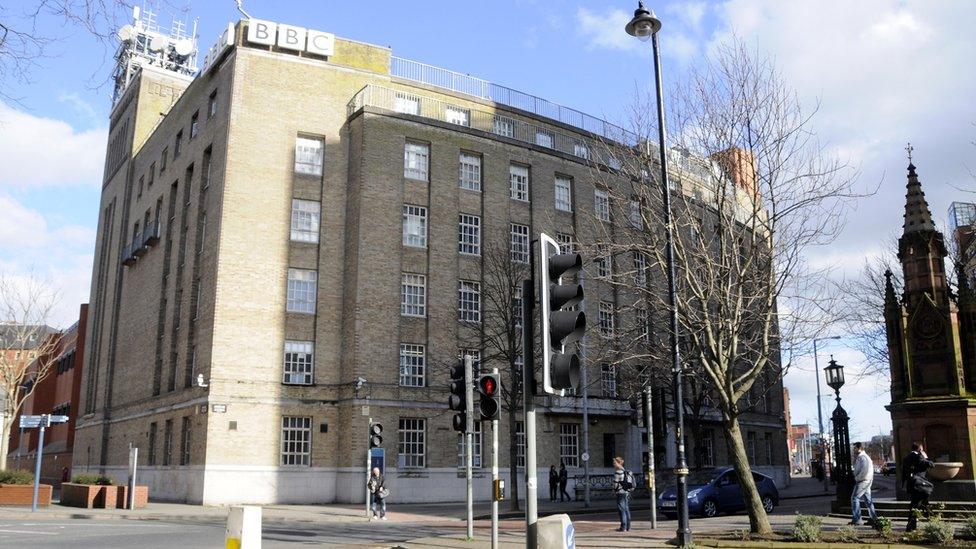Londonderry protest over proposed BBC Radio Foyle cuts
- Published
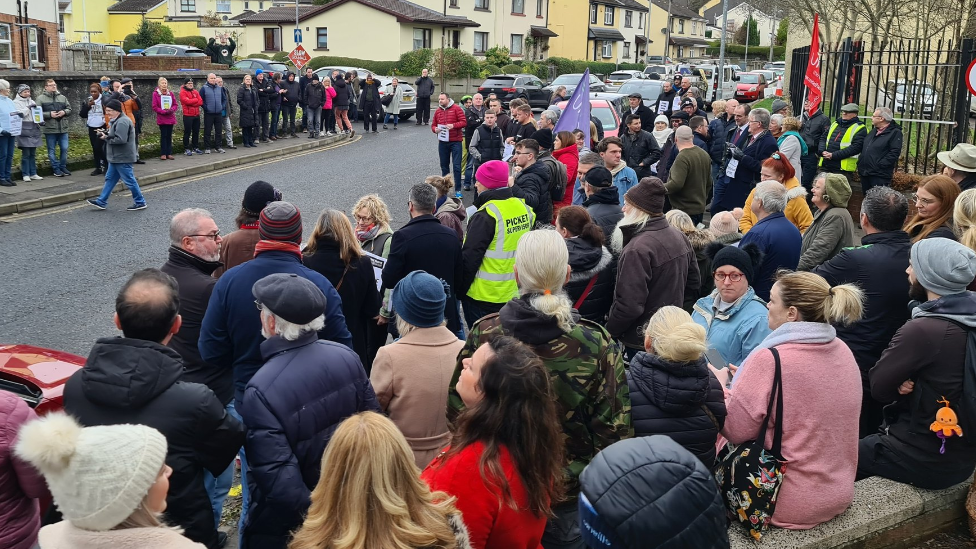
Protestors gathered outside the Radio Foyle station on Northland Road on Wednesday
Politicians, senior clergy and community leaders have called on the BBC to reverse its proposed cuts at Radio Foyle.
Protestors gathered outside the station in Londonderry on Wednesday afternoon.
Eight news staff are at risk of redundancy and output, including the Breakfast Show as well as local news bulletins, is being cut.
It is part of a wider plan announced on Tuesday to close 36 posts across BBC Northern Ireland to make savings.
The interim director of BBC NI said the corporation faced "some difficult choices, none of which are easy".
"We have to find monies to maintain and develop our local presence on BBC iPlayer and to absorb cost pressures across different aspects of our work," Adam Smyth said.
"Our concern in all of this will be to safeguard audience value and benefit and to remain mindful of the impact that this announcement will have on BBC staff in Northern Ireland."
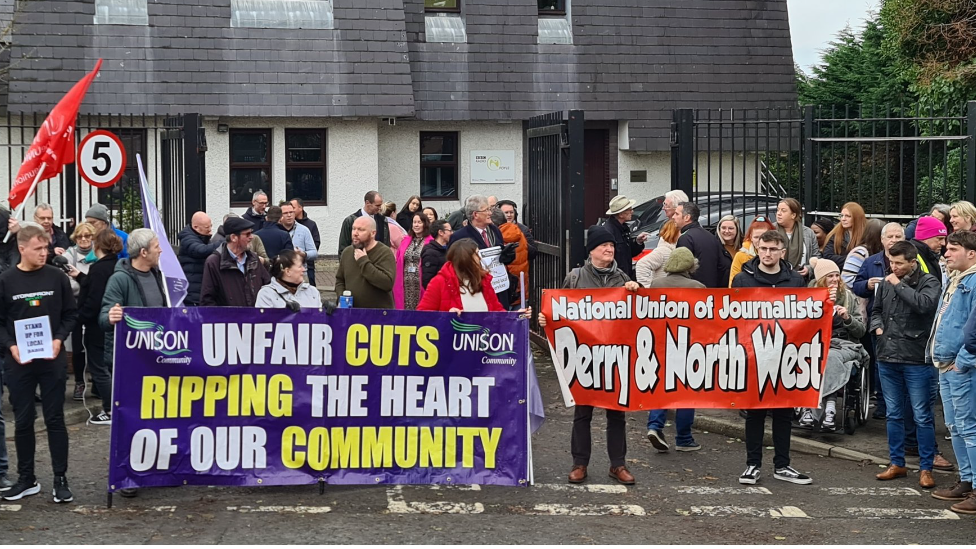
Davey McCauley, who organised Wednesday's rally, said he has been listening to Radio Foyle for about 40 years and said it was so important to everyone in the city and beyond.
"This station is the heartbeat of this community," he told BBC Radio Foyle's News At One.
"Radio Foyle highlights and challenges issues that wouldn't be done anywhere else.
"If they take it away we don't think other broadcasters will cover them; if we lose it then we will lose an integral part of ourselves."
Mr McCauley said the move by the BBC was "a death by a thousand cuts" and believes this was the first step in the potential closure of the station.
'For what is right'
Marie Lindsay, former principal of St Mary's school in Derry, attended the protest because she felt she had to be there.
"I thought my protesting days were over, but you're never too old to protest for what is right," she told BBC Radio Foyle.
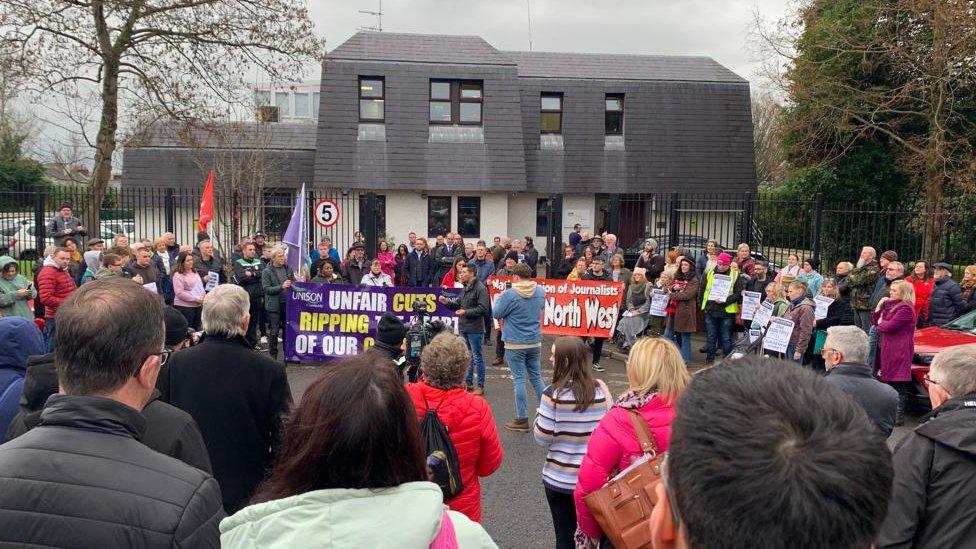
"It is right that BBC Radio Foyle is here and remains here in its full capacity.
"The turnout and the spectrum of people who have gathered here is quite unique.
"BBC Northern Ireland needs to understand the swell of feeling and swell of support for the staff and the work they do."
'Old media versus new media'
However Alice Enders, who is an expert in the creative industries, told BBC's Good Morning Ulster programme that the BBC was in a "squeeze in terms of its revenue".
"The BBC has to keep pace with the development of the internet," she said.
"There is no doubt these cuts were made with a heavy heart because local radio is a popular with audiences," she said.
However she added that there has been a "major migration to online services" with audiences.
She said the BBC was facing alot of competition from streaming services.
"This is old media versus new media," she added.
"Everyone would like to have online services and at the same time maintain and keep all the local radio services - I'm very attached to local radio.
"But at the same time we are talking about a frozen licence fee and inflation," she said.
"None of these cuts are made with the stroke of a pen," she added.
Media commentator Stephen Price said the BBC was in the position where "its licence fee has been frozen therefore it is having to find cuts somewhere."
"News is the most expensive thing that the BBC does and it's probably not surprising that news is being cut," he added.
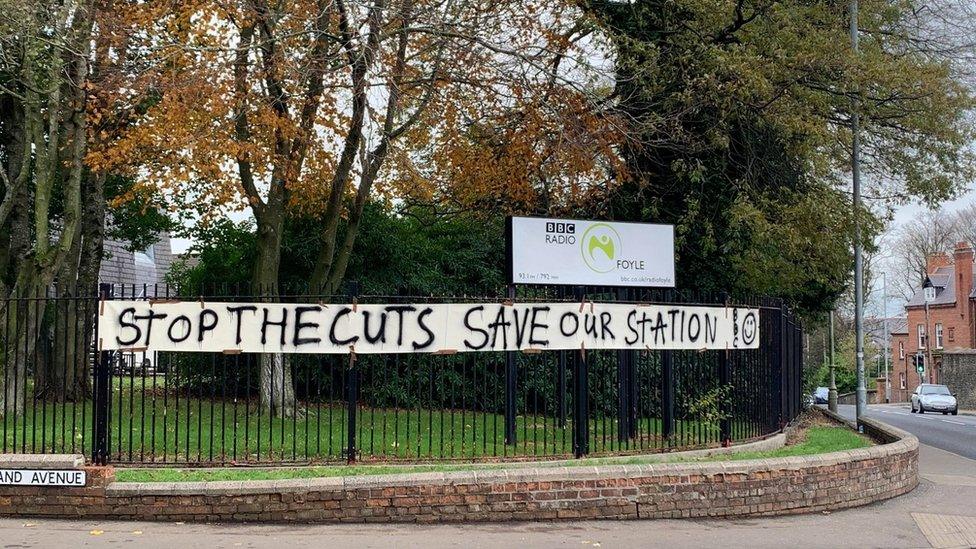
A makeshift sign was put up by protestors on the gates of the radio station on Wednesday
Under the proposals for BBC Radio Foyle, a daily 30-minute news programme will remain on BBC Radio Foyle along with the Mark Patterson Show and the Sean Coyle Show.
BBC Northern Ireland is planning to close 36 posts in an attempt to make £2.3m of savings and invest more money in online services.
According to the most recent BBC annual report, BBC NI has a workforce of about 600, with the majority of those employees based in Belfast at Broadcasting House and Blackstaff.
Staff and trade unions will now be consulted on the proposed savings plans.
'Engine room'
Foyle MP and SDLP leader Colum Eastwood raised the concerns around cuts to BBC Radio Foyle at Prime Minister's Questions on Wednesday.
Prime Minister Rishi Sunak said he believed "very strongly in local public broadcasting" and would speak to the BBC about the cuts to BBC Radio Foyle.
The Bishop of Derry and Raphoe, the Right Reverend Andrew Forster, said: "What the BBC isn't getting, what we just heard from Adam Smyth that he doesn't understand is the uniqueness of Radio Foyle and the impact for our community."
Bishop Donal McKeown said: "Northern Ireland would be the poorer for not having that engine room generating news here."
- Published29 November 2022
